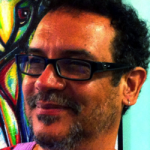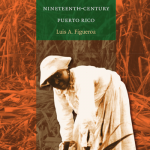This is site is presently under construction.
 This site belongs to Luis Figueroa-Martínez, Associate Professor of History, Department of History, Trinity College, Hartford, Connecticut.
This site belongs to Luis Figueroa-Martínez, Associate Professor of History, Department of History, Trinity College, Hartford, Connecticut.
I will be working on this site during my upcoming sabbatical leave in the winter-spring of 2013.
In the meantime, you can catch up with me on Facebook (www.facebook.com/luisfigueroamartinez) and Twitter (@historialatina).
Teaching
I have worked at Trinity since 1996. I teach courses on the Caribbean, Latin America, the African Diaspora in Latin America and the Caribbean, Latinas & Latinos in the United States, Urbanism & Urban History, and Film Studies (historical fiction and documentary films). I’m affiliated also with the Caribbean & Latin American Studies concentration in the International Studies Program (CLAS-INTS), the Film Studies interdisciplinary minor (which I coordinated from February 2005 to September 2009), as well as with the American Studies Program and the new interdisciplinary Urban Studies minor recently created by Trinity’s Center for Urban and Global Studies.
Before coming to Trinity College in 1996, I worked at the University of Connecticut in Storrs, as an Instructor and Assistant Professor of History, as well as an Associate Director of its Center for Latin American and Caribbean Studies, and as co-founder of its Institute for Puerto Rican Studies, which was created in 1994.
Research and Creative Work
 My first book, Sugar, Slavery and Freedom in Nineteenth-Century Puerto Rico, was jointly published in 2005 by The University of North Carolina Press and Editorial de la Universidad de Puerto Rico. The book won an Honorable Mention in the essay category as awarded by the Puerto Rico Chapter of the PEN International Club. The book deals with the transition from slavery to free labor in the sugar plantations of south-eastern Puerto Rico, centered around the municipality (county) of Guayama and its region.
My first book, Sugar, Slavery and Freedom in Nineteenth-Century Puerto Rico, was jointly published in 2005 by The University of North Carolina Press and Editorial de la Universidad de Puerto Rico. The book won an Honorable Mention in the essay category as awarded by the Puerto Rico Chapter of the PEN International Club. The book deals with the transition from slavery to free labor in the sugar plantations of south-eastern Puerto Rico, centered around the municipality (county) of Guayama and its region.
I have worked as script consultant in the documentary film “Puerto Rican Passages” (directed and produced by Frank Borres, which premiered on Connecticut Public Television in 1995), a film dealing with the Puerto Rican migration to Connecticut; as an Associate Producer (uncredited) in the documentary film “Ritmo de Pueblo \ Rhythm of the People” (directed and produced by Glenn Orkin, which premiered on Connecticut Public Television in 2001), a film dealing with the role of music in Puerto Rican culture, both on the island and the diaspora in the United States; and as director, editor and producer of two short documentary films (“Umoja House 2003”; and “Cinestudio Forum 2006”), that deal with issues of race, class, sexism and homophobia at Trinity College.
I also served as co-producer of a vast documentary film project led by the Hartford Studies Project (Susan Pennybacker, executive producer; Pablo Delano, co-producer; and Glenn Orkin, director of cinematography), which dealt with issues of race, class and urban inner-city African-American and Puerto Rican communities in Hartford from the 1960s to the 2000s decade.
I’m currently working on two books. The one closest to completion focuses on the themes of race, migration and diaspora, colonialism and cultural nationalism while recounting the rise of basketball in Puerto Rico since the 1960s. Sports is the most prominent field in which Puerto Rico is recognized internationally as an independent country. Its “National Basketball Team” has distinguished itself in regional and world competitions since the late 1950s, especially among national teams in the Americas. It became in the 1970s one of the most important manifestations of deeply– and widely–felt cultural nationalism among island Puerto Ricans and many Puerto Ricans in the diaspora.
The other book manuscript, from which the basketball project actually emerged as part of one chapter, focuses on issues of urbanism and colonial urbanization and modernization in Puerto Rico since the 1930s. It examines the history and urban semiotics of the Franklin Delano Roosevelt boulevard in urban\suburban San Juan and Guaynabo.
Beyond Trinity
In 2011–2012, I serve as Treasurer and Website Editor of the Puerto Rican Studies Association (PRSA), the organization that brings together scholars, teachers, public policy experts, community activists and graduate students whose work focuses either on Puerto Rico or Puerto Ricans in the United States, or both. PRSA has members working or studying in institutions located in the United States, Puerto Rico, the Caribbean region, Europe and Canada.
In PRSA’s 2012 Executive Council elections, I was elected to serve as Communications and Publications Officer for the January 2013 to December 2014 biennial cycle. A major part of my duties will be continuing to serve as the editor of PRSA’s website (www.puertoricanstudies.org), Facebook Page (www.facebook.com/puertoricanstudies), and Twitter Account (@Boricua_Studies). Not having to serve PRSA as Treasurer at the same time as being in charge of its communications work will allow me, for example, to devote more time to expanding its website, particularly updating its blog more often with new articles (by multiple authors) and offering new services through the website to PRSA’s members and the public at large.
